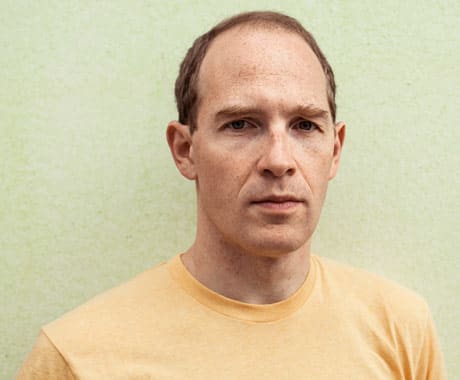It has taken Dan Snaith (aka Caribou) a lifetime to find a sound he can happily call his own. From his early work as Manitoba to the psych rock homage of Andorra and the dance floor-friendly Daphni, it seemed as if Snaith was putting on a different hat for every release. But Our Love, out October 7 on Merge Records, sees the Canadian ex-pat expanding upon the sound he nailed so perfectly on his acclaimed Swim.
For a man who is by all accounts happy in his life and career, Our Love is surprisingly sombre, in parts coming across as a break-up album. "It's melancholy at times," concedes Snaith. "But it's a mix of emotions and feelings that aren't necessarily about my relationship right now. It might be the age I'm at, but I'm finding myself being more nostalgic these days and the album certainly reflects that."
Drawing heavily on personal experience, the mixed emotions on the record are a mirror of the way life unfolds. "I had a friend pass away in the same week that my daughter started speaking," Snaith explains. "So it's been a very mixed time. I feel like that's the beauty and richness of life — we're experiencing so many different emotions simultaneously." This complex and bittersweet emotional quality defines Our Love, most prominently on the downcast "Dive," one of four tracks on the album featuring strings provided by Owen Pallett, and "Second Chance" featuring Hamilton's Jessy Lanza on vocals.
Sonically, key characteristics of the tracks on Our Love are a crisp palette and pared-back composition that, while sounding undeniably contemporary, also harken back to the early days of techno and house. Their simplicity goes against the current tide in electronic music towards maximalism and freneticism.
"The whole maximalist EDM thing is fine and I can't criticize that approach because it feels very contemporary to me," says Snaith. "That is the state of our culture — this kind of 'everything at once' schizophrenia in combining lots of elements and, when done well, I don't have any problem with it." After all, by his own admission, Snaith's older records were heavily maximalist. "I would throw as many samples as I could into the mix so it's just this kind of cacophony going on and I loved that." In recent years however, Snaith has been drawn to the opposite approach, placing every sound precisely and thinking carefully about what purpose each individual component of the track serves. "I feel like this is the record that I took that idea on board the most."
He adds that it's important that there be this maximal music that's transgressive for teenagers — "that allows kids to go out and do drugs and defy their parents and that captures their experience" — but it just doesn't relate much to what he's interested in now. "I'm intrigued to see where it goes though — can the builds and drops keep getting more and more intense over the years to come?" he ponders "It seems hard to imagine. Or will things have to be torn down and start again in some other mould?"
For a man who is by all accounts happy in his life and career, Our Love is surprisingly sombre, in parts coming across as a break-up album. "It's melancholy at times," concedes Snaith. "But it's a mix of emotions and feelings that aren't necessarily about my relationship right now. It might be the age I'm at, but I'm finding myself being more nostalgic these days and the album certainly reflects that."
Drawing heavily on personal experience, the mixed emotions on the record are a mirror of the way life unfolds. "I had a friend pass away in the same week that my daughter started speaking," Snaith explains. "So it's been a very mixed time. I feel like that's the beauty and richness of life — we're experiencing so many different emotions simultaneously." This complex and bittersweet emotional quality defines Our Love, most prominently on the downcast "Dive," one of four tracks on the album featuring strings provided by Owen Pallett, and "Second Chance" featuring Hamilton's Jessy Lanza on vocals.
Sonically, key characteristics of the tracks on Our Love are a crisp palette and pared-back composition that, while sounding undeniably contemporary, also harken back to the early days of techno and house. Their simplicity goes against the current tide in electronic music towards maximalism and freneticism.
"The whole maximalist EDM thing is fine and I can't criticize that approach because it feels very contemporary to me," says Snaith. "That is the state of our culture — this kind of 'everything at once' schizophrenia in combining lots of elements and, when done well, I don't have any problem with it." After all, by his own admission, Snaith's older records were heavily maximalist. "I would throw as many samples as I could into the mix so it's just this kind of cacophony going on and I loved that." In recent years however, Snaith has been drawn to the opposite approach, placing every sound precisely and thinking carefully about what purpose each individual component of the track serves. "I feel like this is the record that I took that idea on board the most."
He adds that it's important that there be this maximal music that's transgressive for teenagers — "that allows kids to go out and do drugs and defy their parents and that captures their experience" — but it just doesn't relate much to what he's interested in now. "I'm intrigued to see where it goes though — can the builds and drops keep getting more and more intense over the years to come?" he ponders "It seems hard to imagine. Or will things have to be torn down and start again in some other mould?"
